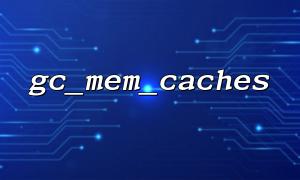In PHP, gc_mem_caches is an internal function related to Garbage Collection (GC), used to manage memory caches. GC is a critical mechanism in PHP’s memory management that automatically clears unused objects during runtime, releasing memory and preventing memory leaks. Understanding the return values of gc_mem_caches is vital for developers to optimize memory usage and improve program performance.
gc_mem_caches is primarily used to return the memory cache status associated with PHP’s garbage collection. The function returns an array containing information about memory caches used during the garbage collection process, such as the state of object buffers, linked lists, and other data structures.
During garbage collection, part of the memory is used as buffers to temporarily hold objects that are about to be collected. The return value of gc_mem_caches reflects the current state of these buffers, including the number of cached objects, the amount of memory used, and more.
The gc_mem_caches function returns an associative array with several key-value pairs, commonly including:
"num_free": Indicates the number of currently free object caches.
"num_allocated": Indicates the number of currently allocated object caches.
"memory_used": Represents the amount of memory (in bytes) currently used by the garbage collection buffer.
"num_collections": Shows the number of garbage collection cycles that have occurred since PHP started.
With this data, developers can gain insight into the behavior of the memory collection mechanism and determine whether PHP’s garbage collection parameters, such as gc_divisor and gc_probability, need adjustment.
Memory Optimization: When a program involves the frequent creation and destruction of objects, understanding the return values of gc_mem_caches helps assess memory usage. If certain buffers consume excessive memory, it may indicate a need to optimize object lifecycle management.
Performance Analysis: By observing cache data from garbage collection, developers can evaluate the efficiency of the GC process. For example, if garbage collection runs too frequently (a high num_collections value), adjusting the trigger conditions might be necessary.
Resource Release Monitoring: If memory leaks occur, information from gc_mem_caches can help determine whether memory is not being released in time, making it easier to analyze whether garbage collection is functioning properly.
<span><span><span class="hljs-meta"><?php</span></span><span>
</span><span><span class="hljs-comment">// Check the return values of gc_mem_caches</span></span><span>
</span><span><span class="hljs-variable">$gc_cache</span></span><span> = </span><span><span class="hljs-title function_ invoke__">gc_mem_caches</span></span><span>();
<p></span>// Output the current garbage collection cache status<br>
print_r($gc_cache);<br>
?><br>
</span>The above code will print the garbage collection cache information, as shown below (actual output may vary depending on the environment):
<span><span><span class="hljs-title function_ invoke__">Array</span></span><span>
(
[num_free] => </span><span><span class="hljs-number">10</span></span><span>
[num_allocated] => </span><span><span class="hljs-number">30</span></span><span>
[memory_used] => </span><span><span class="hljs-number">20480</span></span><span>
[num_collections] => </span><span><span class="hljs-number">5</span></span><span>
)
</span></span>This method allows developers to clearly view memory usage by garbage collection and make performance optimizations accordingly.
gc_mem_caches provides detailed insights into PHP’s internal garbage collection memory caches. This information is crucial for tuning PHP memory management, reducing leaks, and improving performance. Understanding its return values and applying memory optimizations based on actual needs helps developers maintain better control over application memory usage.


